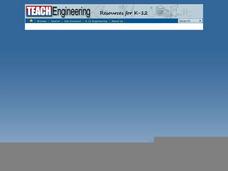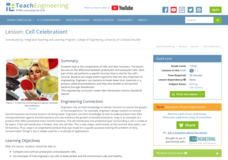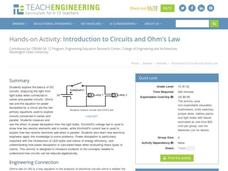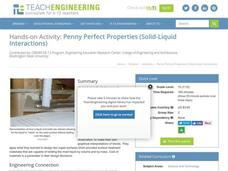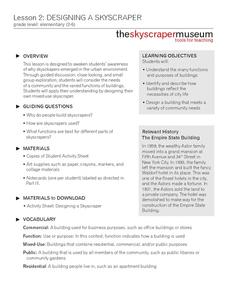Teach Engineering
Both Fields at Once?
An MRI uses both a magnetic and electricity, so how do the two interact with each other? Class members observe the effects on a charged particle when it is subject to both an electrical and magnetic field. The teacher background...
Teach Engineering
Cell Celebration!
Are you eukaryotic? (Answer: Yes.) The first of six installments in the Cells units teaches pupils about the similarities and differences of prokaryotes and eukaryotes. It also covers the functions of various cell components in both...
Teach Engineering
Energy Forms, States and Conversions
Even magicians can't make energy disappear. In a discussion-based activity, young scientists learn about energy forms and conversions. They see how energy is neither created nor destroyed; it just changes forms. This is the 11th...
Teach Engineering
The Energy Problem
Think you can solve the energy problem? You'll first need to know about current energy use. Analyzing a set of circle graphs lets scholars see where energy consumption is the greatest, both by sector and by household use. They develop a...
Curated OER
Constructions and Creations: Sturdy Structures
Have your class draw the plans and design a structure. Learners discuss and investigate the variables in the stability of a 2D and 3D model. They also consider how to add a circuit to the design. Afterwards, they present their work.
TryEngineering
Exploring at the Nanoscale
Discover a world too small to see. In the lesson, young scientists learn about nanotechnology and brainstorm ideas for new applications of it. They perform an activity to determine how surface area changes when objects are made smaller...
TryEngineering
Nano Waterproofing
Does your shirt hate water? In the activity, future engineers observe the hydrophobic effect in fabrics. They brainstorm and test some ideas for waterproofing fabrics.
Curated OER
Math On the Job
Investigate different types of math required for specific jobs. In this math in occupations activity, use the Internet to research what type of math one might need to know in order to be successful in different jobs. Complete a related...
Education World
Use Boolean Search Terms to Shorten Web Searches
Have you ever conducted a Web search and received too many hits? Teach your class about Boolean search terms and provide them time to practice conducting efficient online searches. This lesson plan contains several fun activities which...
Teach Engineering
Insulation Materials Investigation
Don't melt away! Pairs investigate different insulation materials to determine which one is better than the others. Using a low-temp heat plate, the teams insulate an ice cube from the heat source with a variety of substances. They...
Teach Engineering
Introduction to Circuits and Ohm's Law
Take a very basic understanding of circuits and develop a strong understanding of the parts and function of a circuit. This activity is developed to be an independent exploration of circuits from the basics to series and parallel models....
Teach Engineering
Fluid Power Basics
What can bulldozers and screen doors have in common? Use this lesson on fluid power to find out. It begins with some simple teacher demonstrations, includes a couple of videos, and culminates with an inquiry-based activity to investigate...
Teach Engineering
Hydrogen-Oxygen Reaction Lab
High schoolers conduct an experiment using the reaction of hydrogen and oxygen. After pairs balance the chemical equation for making water, they mix different ratios of hydrogen and oxygen in a chemical reaction. Classmates...
Teach Engineering
The Fibonacci Sequence and Robots
What better way to introduce the idea of a sequence than with robots! An educational lesson explains the classic Fibonacci sequence before pupils build and program a robot to move. Additionally, the lesson challenges individuals to...
Teach Engineering
Penny Perfect Properties (Solid-Liquid Interations)
I can get more water to stay on a penny than you can! Collaborative pairs determine the volume of liquids that can be contained on the surface of copper pennies and plastic coins. The pairs analyze their results using graphs and go on to...
Skyscraper Museum
What is a Skyscraper?
Skyscrapers are amazing feats of architectural design that create the iconic skylines of the world's biggest cities. Young architects explore the defining characteristics of these monstrous towers with the first lesson in this four-part...
Skyscraper Museum
Designing a Skyscraper
Besides serving as awe-inspiring monuments of human achievement, skyscrapers are built to perform a wide range of functions in urban communities. The second lesson in this series begins by exploring the history of the Empire State...
Skyscraper Museum
Building a Skyscraper
Creating buildings that reach hundreds of feet into the sky is no easy task. The third instructional activity in this series begins with four activities that engage young architects in exploring the major challenges that are faced when...
Institute of Electrical and Electronics Engineers
Tennis Anyone?
After reading up on the history of sports racquets, engineering teams design and construct a racquet for batting a Velcro-striped ball at a target. Teams evaluate their design by aiming for the target three times each and answering...
Institute of Electrical and Electronics Engineers
Be a Scanning Probe Microscope
Extensive reading is done in order to learn about scanning probe microscopy and nanoscale. Afterward, individuals use a pencil to probe an unidentified object that is inside of a box so that they cannot see it. Using only what they could...
Institute of Electrical and Electronics Engineers
A Question of Balance
It's a neat idea, but the task of designing a system for filling jars with consistent specific amounts of a product may be a little out of reach, especially for younger pupils. Intended as an engineering design lesson, this may be better...
Institute of Electrical and Electronics Engineers
Radio Reception and Transmission
After reading about radio transmission, application, and the difference between AM and FM, small teams of engineers use a kit to construct an FM radio and then send and receive broadcasts. This is an ideal activity for middle school STEM...
Institute of Electrical and Electronics Engineers
Arduino Blink Challenge
Emerging engineers read about Arduino software and how it can be used. Then they follow a nine-step tutorial to connect an Arduino board to a computer and put it to work! The objective is to code a program that will cause an LED to...
Institute of Electrical and Electronics Engineers
Failure: Seeds of Innovation
"If at first you don't succeed, try, try again!" Through this assignment, emerging engineers examine how failed experiments are simply part of the process of an outstanding design. They begin with some reading about the microwave oven,...
Other popular searches
- Computer Lab Behavior
- Computer Lab Safety Rules
- Technology Resources Word
- Computer Lab Activities
- Computer Lab Rules
- Computer Lab Safety
- Computer Lab Projects
- Computer Lab Lessons
- Computer Lab for Equations
- Safety in Computer Lab
- Computer Lab Procedures
- Integer Computer Lab


